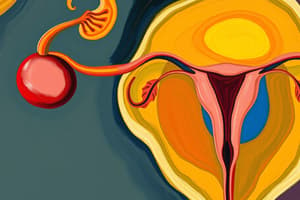Podcast
Questions and Answers
What is a common issue that can negatively impact sexual health?
What is a common issue that can negatively impact sexual health?
- Regular menstrual cycles
- Consistent hydration
- Vaginal dryness (correct)
- Increased libido
Which hormonal factor is primarily involved in regulating the menstrual cycle?
Which hormonal factor is primarily involved in regulating the menstrual cycle?
- Progesterone
- Estrogen (correct)
- Insulin
- Testosterone
What condition can result from pelvic issues or infections?
What condition can result from pelvic issues or infections?
- Increased sexual desire
- Vaginal lubrication
- Painful intercourse (correct)
- Menstrual regularity
What is a recommended practice prior to a gynecological examination?
What is a recommended practice prior to a gynecological examination?
Which of the following is NOT typically associated with a normal menstrual cycle?
Which of the following is NOT typically associated with a normal menstrual cycle?
What is a common consequence of insufficient lubrication during intercourse?
What is a common consequence of insufficient lubrication during intercourse?
What condition might result from hormonal imbalances or menstrual irregularities?
What condition might result from hormonal imbalances or menstrual irregularities?
Which practice is essential for identifying abnormalities during a gynecological examination?
Which practice is essential for identifying abnormalities during a gynecological examination?
What is a potential risk factor for infections related to intimate areas?
What is a potential risk factor for infections related to intimate areas?
What symptom could indicate a need to consult for potential pelvic issues?
What symptom could indicate a need to consult for potential pelvic issues?
Flashcards
Painful intercourse
Painful intercourse
Discomfort or pain during sexual activity.
Sexual history
Sexual history
Details of past sexual experiences and exposures.
STI/STD
STI/STD
Sexually transmitted infections/diseases
Pelvic pain
Pelvic pain
Signup and view all the flashcards
GYN exam
GYN exam
Signup and view all the flashcards
Lubrication
Lubrication
Signup and view all the flashcards
Estrogen
Estrogen
Signup and view all the flashcards
Menstrual Cycle
Menstrual Cycle
Signup and view all the flashcards
GYN Pap Smear
GYN Pap Smear
Signup and view all the flashcards
Study Notes
Female Genitourinary System (NURS 313)
- Objectives:
- Identify external structures of the female genitalia
- Describe internal female genitalia
- Outline puberty changes
- Detail changes during pregnancy
- Explain perimenopausal changes
- Apply health promotion concepts during assessments
External Genitalia (Vulva)
- Structures:
- Mons pubis
- Labia majora
- Labia minora
- Clitoris
- Urethral meatus
- Skene glands
- Vaginal orifice
- Hymen
- Bartholin glands
- Lubricates during intercourse
- Abnormal secretions may be noted.
Internal Genitalia
- Structures:
- Vagina
- Cervix
- Squamocolumnar junction
- Anterior fornix
- Posterior fornix
- Uterus
- Fallopian tubes
- Ovaries
Developmental Considerations
- Infants: External genitalia engorged due to maternal hormones
- Adolescents: Puberty-related changes (breast development, pubic hair, menarche) Average age of menarche is 12.25
- Pregnant females: Uterus expands to accommodate the fetus
- Aging females: Menopause (48-51 years), decline in ovarian function, vaginal drying, potential dyspareunia, vaginal atrophy, urinary incontinence risk.
Cultural Considerations/Sexual Identity
- Importance of privacy during examinations
- Awareness of menarche and pubertal rites in different cultures
- Considerations for transgender care
IDD Care (Intellectual and Developmental Disability)
- Relationships, intimacy, and sexuality may be overlooked for individuals with IDD
- Sensitive questions regarding sexual relationships are essential.
- Developmentally appropriate education and counseling regarding safety is important
- Women with IDD may have higher risk of adverse health during pregnancy (DVT, preeclampsia) and later in life (related to obesity, epilepsy, polypharmacy, mental health, poverty and early menopause.)
Subjective Data
- Biographical data
- Chief complaint (followed by possible pelvic pain, pain with urination or intercourse and abnormal discharge.
- Past history (menstrual cycle, obstetrical history, etc)
- Family history (menopause)
- Functional assessment (lifestyle/health practices)
- Gynecological history (recent papsmear information)(sexual history/STIs/HPV vaccine)
Additional History for Aging Adults
- Postmenopausal bleeding: Possible risk for cancer
- Uterine prolapse
- Sexual satisfaction Factors like vaginal dryness and itching.
Objective Data (General)
- Explain exam purpose to ease anxiety and ensure patient comfort
- Establish equipment
- Empty bladder/Gown/Privacy
- Initial sitting or lithotomy position
- Examine external genitalia (inspection & palpation)
- Specific areas to assess (during palpation) Skene, Bartholin glands and pelvic musculature support.
Objective Data (Physical Exam)
- Inspection: Skin color, hair distribution, labia majora/minora characteristics, clitoris , urethral opening, vaginal opening, perineum and anus.
- Palpation: Evaluate Skene and Bartholin's glands & support of pelvic musculature.
Objective Data (Older Adult Considerations)
- Cervix: May appear paler or thinner after menopause
- Decreased vaginal lubrication: Can lead to painful intercourse
Studying That Suits You
Use AI to generate personalized quizzes and flashcards to suit your learning preferences.




